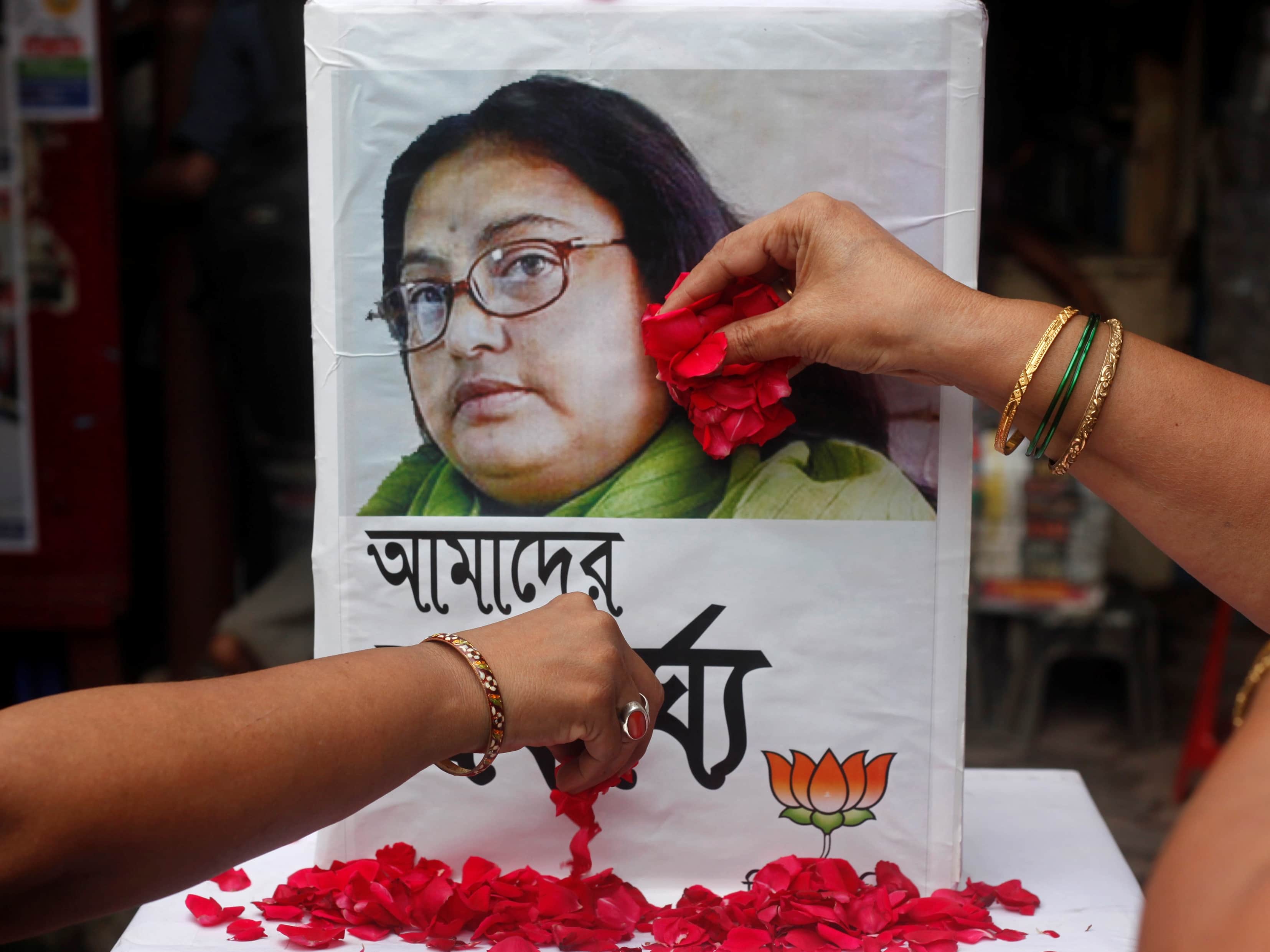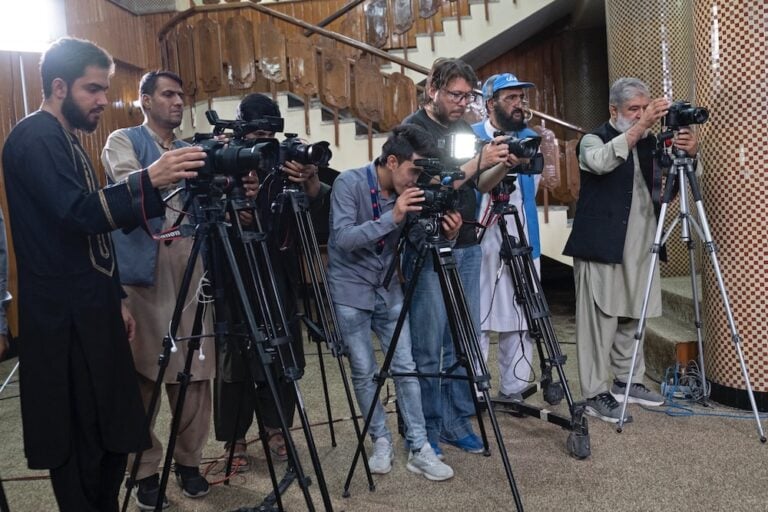PEN International welcomes the police investigation into the shocking murder of Indian diarist Sushmita Banerjee in Afghanistan; however, the organisation expresses its mounting concern over the escalating pattern of attacks on writers and journalists in the country.
PEN International welcomes the police investigation into the shocking murder of Indian diarist, Sushmita Banerjee, killed in Kharana, Afghanistan, on 5 September 2013. However, the organisation expresses its mounting concern for the escalating pattern of attacks on writers and journalists in the country. PEN International calls upon the Afghan authorities to ensure that those responsible for Banerjee’s murder are brought to justice in accordance with international fair trial standards, and demands that all possible steps are taken to protect writers at risk in the country according to Afghanistan’s commitments under national and international law.
TAKE ACTION:
Please send appeals:
• Expressing mounting concern about the escalating pattern of attacks on writers and journalists in Afghanistan, which has culminated recently in the shocking murder of Indian diarist, Sushmita Banerjee;
• Seeking assurances that all threats and attacks against writers and journalists are vigorously investigated so that those responsible can be brought to justice;
• Demanding that all necessary steps are taken to protect writers at risk in the country.
Appeals to:
His Excellency Hamid Karzai
President of the Islamic State of Afghanistan
Kabul
Islamic Republic of Afghanistan.
Mr. Rahimi
Presidential Secretariat
E-mail: surosh.r@gmail.com / president@arg.gov.af
Please send appeals via the Ambassador for Afghanistan in your country, asking for their comments.
**Please check with this office if sending appeals after 15 October 2013**
Background
On 9 September 2013, local police officials reportedly arrested two men – initially said to be armed militants connected to the Haqqani Network, an affiliate of the Taliban which has connections to Pakistan – in connection with the murder of Sushmita Banerjee (known variously as Sahib Kamala, Sushmita Bandopadhyay), author of the best-selling memoir A Kabuliwala’s Bengali Wife. According to press reports, the suspects confessed to Banerjee’s murder. Local villagers reportedly led the police to the men, who were said to have been found with weapons, including explosives. Four other men arrested on 11 September reportedly indicated to the Afghan authorities that the plan was orchestrated in Pakistan by three Pakistani Taliban militants working with a local commander of the Afghan Taliban in Paktika. According to the BBC, the Afghan Taliban has denied responsibility for the attack. The precise reasons for the attack are unknown, but reports suggested that Banerjee was targeted by the group because of her critical writings of the Taliban in her memoir and for installing an Internet connection in her house. Subsequently, on 15 September, news reports indicated that a splinter Taliban group – known as the Suicide Group of the Islamic Movement of Afghanistan – had admitted responsibility for Banerjee’s murder via a Western news website, claiming they had killed her because she was an “Indian spy”, which her family denied.
Banerjee, aged 49, the wife of an Afghan businessman, was shot dead by armed assailants on 5 September 2013. According to reports, the men broke into her home and tied up her husband before kidnapping and shooting her at least 20 times. Banerjee’s body was left outside a madrasa (religious school) on the outskirts of Sharan City, Paktika province. Banerjee was an Indian Hindu who converted to Islam after marrying her husband, an Afghan Muslim, in 1989, but fled back to India after the Taliban took control of Paktika Province in 1993. Her memoir, published in 1998, retells her life in Afghanistan and subsequent flight from the country in 1995 after suffering persecution by the Taliban, including being whipped for refusing to wear a burqa and having a death fatwa issued against her. The book was later made into the 2003 Bollywood film Escape From Taliban. Banerjee had recently returned to Afghanistan to live with her husband and run a midwifery clinic. She had reportedly been filming the lives of local women as part of her work prior to her death, and was writing a second book.
Banerjee’s murder illustrates an escalating pattern of violence against writers and journalists in Afghanistan. PEN International is aware of at least two writers who have been forced to flee Afghanistan since the beginning of the year after receiving death threats. They include prominent Hazara writer Mohammad Jan Taqi Bakhtiari, an award-winning Afghan novelist, who was accused of blasphemy and given a death fatwa in January 2013 by a leading Islamist cleric, Sayyid Mohsen Hujjat, for his latest book Gumnani (Anonymity), published in October 2012. Following the book’s publication, Bakhtiari received numerous death threats through phone calls and text messages. In one incident, unknown people attacked his car on the streets of Kabul and later he found his books burned in front of his house. Bakhtiari went into hiding after receiving death threats, and fled to India on 9 January 2013. His family joined him on 20 February 2013. He has been granted refugee status by the UNHCR and is awaiting resettlement to a safe country. There are continued fears for his safety.
The Afghan Journalists Safety Committee (AJSC) notes that the trajectory of violence against journalists in 2013 has increased significantly when compared to previous years. The Afghan Journalists Center (AfJC) registered 62 cases of violence against media and journalists from January to August 2013, 11 of whom were print journalists; the incidents include murders, injuries, physical and verbal abuse, death threats and the closure of media outlets. Government officials and security forces, the Taliban and illegal armed groups are among the alleged perpetrators of these violent attacks. In addition to concern for increasing violence against journalists the AJSC also reports that the media faces increased financial challenges and growing restrictions with regards to access to information.
The 2004 Constitution provides for freedom of expression in Article 34, declaring “freedom of expression in inviolable”. However, broader restrictions applying to any content which is seen as “contrary to the principles of Islam or offensive to other religions and sects” or defamatory remain in place. Such restrictions place writers at risk in the country.
Four media laws have been approved since 2002 resulting in confusion over which law applies and consequent self-censorship. A recent report states that some articles of the 2009 Mass Media Law have yet to be implemented, whilst institutions established in previous versions of the law remain. In 2012 concerns were raised by both local and international NGOs, about a proposed draft media bill to replace the 2009 law, which if implemented would expand government control over the media, including imposing constraints on the word choice of media outlets. While the 2003 Mass Media Law may have provided a solid foundation for the provision of free expression in Afghanistan, failures in implementation, confusion over subsequent legislation and consequent self-censorship are clearly cause for concern.
The pattern of violence against writers and journalists in Afghanistan is all the more concerning in the light of the fact that the country is preparing for presidential and provincial council elections in 2014, and the withdrawal of international troops. PEN International is calling on the Afghan authorities to place respect for freedom of expression and protection of journalists at the top of its agenda.



